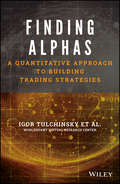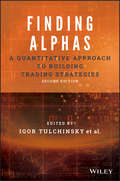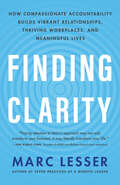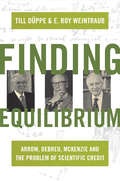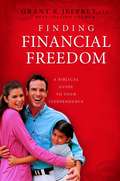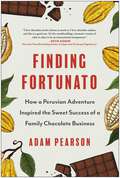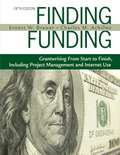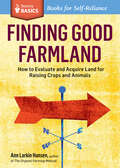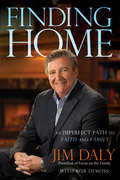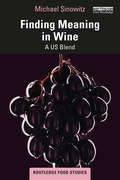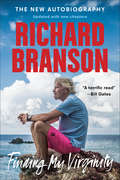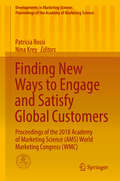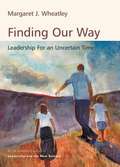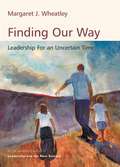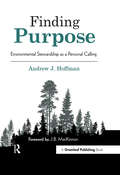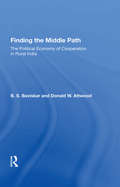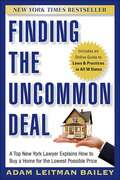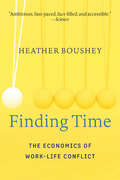- Table View
- List View
Finding Alphas
by Igor TulchinskyDesign more successful trading systems with this practical guide to identifying alphas Finding Alphas seeks to teach you how to do one thing and do it well: design alphas. Written by experienced practitioners from WorldQuant, including its founder and CEO Igor Tulchinsky, this book provides detailed insight into the alchemic art of generating trading signals, and gives you access to the tools you need to practice and explore. Equally applicable across regions, this practical guide provides you with methods for uncovering the hidden signals in your data. A collection of essays provides diverse viewpoints to show the similarities, as well as unique approaches, to alpha design, covering a wide variety of topics, ranging from abstract theory to concrete technical aspects. You'll learn the dos and don'ts of information research, fundamental analysis, statistical arbitrage, alpha diversity, and more, and then delve into more advanced areas and more complex designs. The companion website, www.worldquantchallenge.com, features alpha examples with formulas and explanations. Further, this book also provides practical guidance for using WorldQuant's online simulation tool WebSim® to get hands-on practice in alpha design. Alpha is an algorithm which trades financial securities. This book shows you the ins and outs of alpha design, with key insight from experienced practitioners. Learn the seven habits of highly effective quants Understand the key technical aspects of alpha design Use WebSim® to experiment and create more successful alphas Finding Alphas is the detailed, informative guide you need to start designing robust, successful alphas.
Finding Alphas: A Quantitative Approach to Building Trading Strategies (The Wiley Finance Series)
by Igor TulchinskyDiscover the ins and outs of designing predictive trading models Drawing on the expertise of WorldQuant’s global network, this new edition of Finding Alphas: A Quantitative Approach to Building Trading Strategies contains significant changes and updates to the original material, with new and updated data and examples. Nine chapters have been added about alphas – models used to make predictions regarding the prices of financial instruments. The new chapters cover topics including alpha correlation, controlling biases, exchange-traded funds, event-driven investing, index alphas, intraday data in alpha research, intraday trading, machine learning, and the triple axis plan for identifying alphas. • Provides more references to the academic literature • Includes new, high-quality material • Organizes content in a practical and easy-to-follow manner • Adds new alpha examples with formulas and explanations If you’re looking for the latest information on building trading strategies from a quantitative approach, this book has you covered.
Finding Clarity: How Compassionate Accountability Builds Vibrant Relationships, Thriving Workplaces, and Meaningful Lives
by Marc LesserA SURPRISING PATH TO BREAKTHROUGH COMMUNICATION AND PROFESSIONAL SUCCESS For Marc Lesser the key to healthy relationships and effective workplaces is compassionate accountability — a practical and trainable way to clarify and achieve shared visions of success. Numerous examples include: • facing rather than avoiding conflict for the long-term benefit of all. • working with and through difficult emotions with clarity, care, and connection. • understanding the stories we live by and evaluating whether they’re serving us well. • learning to listen and lead in ways that align with our mission and values. Marc works from the premise that problems are inevitable and that the success of an enterprise or relationship relies on how they are resolved. This applies to any joint effort — in a workplace, a family, a civic organization, a community, a country, or the world at large.
Finding Equilibrium: Arrow, Debreu, McKenzie and the Problem of Scientific Credit
by E. Roy Weintraub Till DüppeThe remarkable story and personalities behind one of the most important theories in modern economicsFinding Equilibrium explores the post–World War II transformation of economics by constructing a history of the proof of its central dogma—that a competitive market economy may possess a set of equilibrium prices. The model economy for which the theorem could be proved was mapped out in 1954 by Kenneth Arrow and Gerard Debreu collaboratively, and by Lionel McKenzie separately, and would become widely known as the "Arrow-Debreu Model." While Arrow and Debreu would later go on to win separate Nobel prizes in economics, McKenzie would never receive it. Till Düppe and E. Roy Weintraub explore the lives and work of these economists and the issues of scientific credit against the extraordinary backdrop of overlapping research communities and an economics discipline that was shifting dramatically to mathematical modes of expression.Based on recently opened archives, Finding Equilibrium shows the complex interplay between each man's personal life and work, and examines compelling ideas about scientific credit, publication, regard for different research institutions, and the awarding of Nobel prizes. Instead of asking whether recognition was rightly or wrongly given, and who were the heroes or villains, the book considers attitudes toward intellectual credit and strategies to gain it vis-à-vis the communities that grant it.Telling the story behind the proof of the central theorem in economics, Finding Equilibrium sheds light on the changing nature of the scientific community and the critical connections between the personal and public rewards of scientific work.
Finding Financial Freedom: A Biblical Guide to Your Independence
by Grant R. JeffreyFollow God's rules for financial freedom. In today's uncertain times, how can you achieve the goal of financial independence? Success depends on a balanced strategy that is based on timeless biblical wisdom and up-to-date financial guidance. Finding Financial Freedom is your guide to prosperity that lasts. Written by Bible scholar and professional financial planner Grant R. Jeffrey, this book shows how you can: · identify and avoid financial traps· escape the spiritual bondage created by a lifestyle of debt · develop a disciplined savings plan that leads to successful investing· claim God's promise of giving and receiving· shift your thinking from "more income" to "keeping more of your income"· make decisions today that will protect your family and guarantee an income through your retirement years.Here is biblical financial wisdom that's as immediate as the bills crowding your mailbox. Get started today on the biblical road to wealth with Finding Financial Freedom.From the Trade Paperback edition.
Finding Fortunato: How a Peruvian Adventure Inspired the Sweet Success of a Family Chocolate Business
by Adam PearsonEmbark on an up-close and personal journey into the northern Peruvian jungle as last-chance entrepreneurs accidentally stumble upon a variety of cacao thought to be extinct, in this chocolate-rich business adventure memoir. Take a front row seat to a family of entrepreneurs searching relentlessly for a sustainable competitive advantage in the wake of many failed attempts at starting a family business. When they inadvertently discover the legendary Nacional white cacao bean in a remote canyon of the Peruvian jungle, the USDA calls it &“an unprecedented discovery.&” The cacao is so rare that even acclaimed author and travel host Anthony Bourdain and chef Eric Ripert trek to this particular jungle to film a segment for Bourdain's "Parts Unknown." With no job and no other way to earn a living, the author&’s brother, Brian, moves to the jungle to live with cacao farmers—and Fortunato Chocolate is born. The family soon realize that their chocolate dream will only work if they reconceive and disrupt the supply chain. Instead of middlemen hoarding profits and keeping farmers in relentless poverty, they trade directly with them and produce what the BBC hails as "the Rolex of chocolate." Follow along as these intrepid entrepreneurs endure many heartbreaking near-victories and nail-biting adventures, ultimately shaking off failure and finding their competitive advantage in the humble white cacao bean and their ethical direct trade with the bean&’s farmers. Finding Fortunato is an inspiring and improbable tale that's infused with the indomitable entrepreneurial spirit, and revels in the gut instincts that lead to unimaginable success.
Finding Funding: Grantwriting From Start to Finish, Including Project Management and Internet Use
by Dr Ernest W. Brewer Dr Charles M. AchillesThe fifth edition of this bestseller brings the reader up-to-date with newly researched Web sites and effective strategies for writing government, foundation, and private grants.
Finding Gold with Theory-Focused Planning
by Chris Trimble Vijay GovindarajanPlanning is crucial for strategic experiments because it establishes the context for learning, but past chapters have explained why the conventional planning process is inappropriate. Theory-Focused Planning (TFP) is an entirely different approach to planning and is much better suited than conventional approaches to the dynamic and uncertain environments faced by strategic experiments. This chapter describes a solution to overcoming the barriers to learning described in chapters 7 and 8, offering six alterations executives should make to the planning process.
Finding Good Farmland: How to Evaluate and Acquire Land for Raising Crops and Animals. A Storey BASICS® Title (Storey Basics)
by Ann Larkin HansenBuying farmland is a major investment, so be sure you make an informed choice. This practical guide covers every factor you should consider before making a purchase, including government regulations, residential concerns from the surrounding area, soil conditions, and savvy financing. Whether you intend to grow abundant crops or graze a robust herd of livestock, Finding Good Farmland provides a roadmap to the land that’s right for you.
Finding Home
by Jim DalyJim Daly, president and CEO of Focus on the Family, managed to rise above his harrowing childhood, which included living in Compton, a suburb of Los Angeles. In this deeply personal memoir, he relives horrors no child should endure. A bloodcurdling neighborhood murder merely serves as the backdrop to the abuse and alcoholism within the four walls of his own home, a cycle broken only by the cancer that left him motherless. Orphaned at an early age, Jim saw firsthand the worst this world had to offer. He somehow managed to catch enough glimpses of grace that he knew he wanted more, both from himself and from a God he had to believe existed. And from that small spark of grace, a great man emerged.
Finding Information for Industry Analysis
by Jan W. Rivkin Ann CullenThis note provides detailed instructions on finding resources for conducting industry analysis, with a special focus on resources available at Harvard Business School. It allows students to transition from doing a Five Forces analysis on the basis of a case, where all relevant facts are provided, to doing a Five Forces analysis in a work setting, without the benefit of a prepackaged case. Exhibits provide detailed information on top resources for industry analysis, instructions for accessing prominent databases, notes on using the Internet and other new media, and some publication-related tricks of the trade pertinent to each step in the industry analysis process.
Finding Meaning in Business
by Bartholomew C. OkonkwoCombining creative biblical interpretation, Christian moral reflection, and business expertise, Finding Meaning in Business is a thoughtful and thought-provoking look at how business leaders, professionals, and students can integrate a sense of calling into their careers and into the business world as a whole.
Finding Meaning in Financial Statements: A Look Behind the Numbers
by Harvard Business School PressFinancial statements identify a company's strengths and weaknesses, but you have to dig, compare, and analyze to extract and understand that information. This chapter shows you how to use ratios and percentage-format statements to understand the company's profitability, key operating activities, solvency, and debt structure.
Finding Meaning in Wine: A US Blend (Routledge Food Studies)
by Michael SinowitzThis book examines controversies in American wine culture and how those controversies intersect with and illuminate current academic and cultural debates about the environment and about interpretation. With a specific focus on the United States of America, the methods that we use to discuss literature and other art are applied to wine-making and wine culture. The book explores the debates about how to evaluate wine and the problems inherent in numerical scoring as well as evaluative tasting notes, whether winemakers can be artists, the discourse in wine culture involving natural wine and biodynamic farming, as well as how people judge what makes a wine great. These interpretative commitments illuminate an underlying metaphysics and allegiance to a culture of reason or feeling. The discussions engage with a broad range of writers and thinkers, such as Roland Barthes, Susan Sontag, Louis Menand, Michael Pollan, Greg Garrard, John Guillory, Amitov Ghosh, Pierre Bourdieu, and Barbara Herrnstein-Smith. The book draws upon not only a number of texts produced by wine critics, wine writers, literary critics and theorists but also extensive interviews with wine writers and multiple California winemakers. These interviews contribute to a unique reflection on wine and meaning. This book will be of great interest to readers looking to learn more about wine from cultural, literary, and philosophical perspectives.
Finding My Virginity: The New Autobiography
by Richard BransonTwenty years after his iconic memoir Losing My Virginity, the world’s ultimate entrepreneur is back with the rest of the story.Richard Branson’s Losing My Virginity shared the outrageous tale of how he built Virgin from a student magazine into one of the greatest brands in history. No challenge was too daunting, no opportunity too outlandish to pursue. And each new adventure started with five simple words: “Screw it, let’s do it.” Now, fifty years after starting his first business, Branson shares the candid details of a lifetime of triumphs and failures and what he really thinks about his unique life and career. Finding My Virginity is an intimate look at his never-ending quest to push boundaries, break rules, and seek new frontiers—even after launching a dozen billion-dollar businesses and hundreds of other companies. As he led Virgin into the new millennium, Branson fearlessly expanded the brand into new categories such as mobile, media, fitness, and banking and into every corner of the globe—all while preserving its iconoclastic, scrappy spirit. He even brought Virgin into space with Virgin Galactic, the world’s first commercial spaceline. Finding My Virginity takes us behind the scenes of the incredible brains, heart, and sacrifices that have gone into making private spaceflight an imminent reality—even after the biggest crisis Branson has ever faced. But this book is much more than a series of business adventures. It’s also the story of Branson’s evolution from hotshot entrepreneur to passionate philanthropist and public servant, via Virgin Unite’s environmental and health initiatives and through the Elders, a council of influential global leaders. And it’s the story of his personal quest to become a better son, husband, father, and “grand-dude” to his four grandchildren. Featuring a supporting cast that includes everyone from Bill Gates to Kate Moss, Nelson Mandela to Barack Obama, this is the gripping account of a man who will never stop reaching for the stars, in more ways than one. Find out how Branson did it for the first time—all over again.
Finding New Ways to Engage and Satisfy Global Customers: Proceedings of the 2018 Academy of Marketing Science (AMS) World Marketing Congress (WMC) (Developments in Marketing Science: Proceedings of the Academy of Marketing Science)
by Nina Krey Patricia RossiThis proceedings volume explores the new and innovative ways in which marketers find new global customers and build meaningful bridges to them based on their wants and needs in order to ensure high levels of customer satisfaction. Customer loyalty is ensured through continuous engagement with an ever-changing and demanding customer base. Global forces are bringing cultures into collision, creating new challenges for firms wanting to reach geographically and culturally distant markets, and causing marketing managers to rethink how to build meaningful and stable relationships with evermore demanding customers. In an era of vast new data sources and a need for innovative analytics, the challenge for the marketer is to reach customers in new and powerful ways. Featuring the full proceedings from the 2018 Academy of Marketing Science (AMS) World Marketing Congress (WMC) held in Porto, Portugal, this volume provides current and emerging research from global scholars and practitioners that will help marketers to engage and promote customer satisfaction. Founded in 1971, the Academy of Marketing Science is an international organization dedicated to promoting timely explorations of phenomena related to the science of marketing in theory, research, and practice. Among its services to members and the community at large, the Academy offers conferences, congresses, and symposia that attract delegates from around the world. Presentations from these events are published in this Proceedings series, which offers a comprehensive archive of volumes reflecting the evolution of the field. Volumes deliver cutting-edge research and insights, complementing the Academy’s flagship journals, the Journal of the Academy of Marketing Science (JAMS) and AMS Review. Volumes are edited by leading scholars and practitioners across a wide range of subject areas in marketing science.
Finding Order in Chaos: Maintaining Clarity of Thought--How Great Leaders Remain Focused Under Pressure
by Justin MenkesAs the world becomes more confusing, it seems like it's getting harder to think clearly. In this chapter, psychologist and executive evaluator Justin Menkes examines what clarity of thought looks like in practice, showing how stress can negatively affect your intelligence. To become a great leader, you need to harness stress as a motivator for intensifying your focus. Menkes shows you how, with a diagnostic exercise for evaluating your ability to find order in chaos and vivid case studies featuring master CEOs Joe Swedish (Trinity Health Systems), Dave O'Reilly (Chevron), and Dick Keyser (W.W. Grainger, Inc.). This chapter was originally published as Chapter 6 of "Better Under Pressure: How Great Leaders Bring Out the Best in Themselves and Others."
Finding Order in Chaos: The Drive to Solve the Puzzle--How Great Leaders Remain Intellectually Confident Under Pressure
by Justin MenkesAs a leader, you must constantly make decisions involving serious consequences based on shifting, incomplete data. Great leaders, however, see these puzzles as stimulating rather than frustrating; the drive to solve the puzzle compels them to move beyond the mere ability to think intelligently in a stressful situation. In this chapter, author Justin Menkes describes how to develop your own drive to find a solution, with examples from master CEOs such as Kevin Sharer (Amgen), A.G. Lafley (Procter & Gamble), and Jim Owens (Caterpillar Inc.). Menkes also provides practical suggestions for improving your ability to think clearly and perform under pressure, offering an exercise you can practice to shed the habit of making mistakes in the heat of the moment. The chapter concludes with a section about personal awareness and its importance in helping you develop the attributes of a great leader through your own experiences with stressful, highly pressurized situations. It is these experiences that teach us to maintain our confidence and improve our capacity to find order in chaos--even within the complex, increasingly interactive economy of the twenty-first century. This chapter was originally published as Chapter 7 of "Better Under Pressure: How Great Leaders Bring Out the Best in Themselves and Others."
Finding Our Way: Leadership for an Uncertain Time
by Margaret J. WheatleyWheatley has worked as an organizational consultant and researcher throughout the world for 30-plus years, and writes, teaches, and speaks about radically new practices and ideas for organizing in chaotic times. She presents a collection of 30 of her essays, previously published over the past ten years. The texts have been revised to represent her current views on fundamental questions of leadership, including how leaders shift from control to order. What motivates individuals. How change occurs. How to evoke people's innate creativity. Useful measurement systems, solving complex problems, creating healthy communities, leading when change is out of one's control, and maintaining integrity and peace as a leader.
Finding Our Way: Leadership for an Uncertain Time
by Margaret J. WheatleyFor years, Margaret Wheatley has written eloquently about humanizing our organizations and helping people to work together more effectively and compassionately. She has shown how breakthroughs in chaos theory and quantum physics can enable organizations to function more like responsive, self-organizing living systems, rather than cold mechanisms of control. And she has gradually expanded these ideas into the wider arena of human society.In short, Margaret Wheatley is one of the most innovative and influential organizational thinkers of our time, and Finding Our Way brings together her shorter writings for the first time, touching on all the topics she has addressed throughout her career, showing how she has applied the ideas in her books s in many different situations. "The pieces presented here", she writes, "represent ten years of work, of how I took the ideas in my books and applied them in practice in many different situations. However, this is not a collection of articles. I updated, revised, or substantially added to the original content of each one. In this way, everything written here represents my current views on the subjects I write about." Provocative, challenging, at times poetic, and often deeply moving, Finding Our Way sums up Wheatley's thinking on a diverse scope of topics from leadership and management to education and raising children in turbulent times; from societal commentary to specific organizational techniques and more.
Finding Purpose: Environmental Stewardship as a Personal Calling
by Andrew J. HoffmanBoth thoughtful and thought-provoking, Finding Purpose aims to challenge our understanding of how humanity interacts with planet Earth, and our role within this. This book is an invitation: would you like to participate in one of the most important projects of imagination, perhaps the greatest ever, in human history? Distilling and refining over 20 pieces from a lifetime of work in academia and trade, across speeches, blogs, editorials and essays, Hoffman invites us to look beyond material growth and explore the role of the individual and business in discovering a wider purpose to bring about a balanced and sustainable society. The reader is encouraged to consider humanity’s relationship with the environment through different lenses: business, academia, faith-based and cultural. By bringing them together, Hoffman encourages us to understand our relationship with the planet in a far more holistic sense. Drawing on ideas from philosophy, literature, natural sciences and politics, Hoffman ensures that the ideas he explores are wholly accessible and applicable. Fully substantiated through various research and examples, the issues described are consistently made relevant to the reader.Finding Purpose is the perfect book for anyone – from student to CEO – thinking about their place in the world, and how making changes in our own lives and societies can impact on the world around us.
Finding The Middle Path: The Political Economy Of Cooperation In Rural India
by B. S. BaviskarSoviet-style socialism has failed; but in Russia, China, and India the transition to capitalism has proven hazardous. Elsewhere, capitalism itself appears to be in crisis, often failing to meet the fundamental needs of workers, small farmers, and even the middle classes. Clearly, the world needs enterprises that are both economically efficient and
Finding The Uncommon Deal
by Adam Leitman BaileyTake advantage of today's real estate market to find great properties at incredible prices Our recent economic meltdown transformed real estate from a popular investment to financial kryptonite. Too many people purchased homes with mortgages they simply could never afford. The good news: Great deals are out there for the taking. Finding the Uncommon Deal gives you the secrets to discovering and successfully negotiating the lowest prices for the most prized properties available. Discover how to go beyond Internet listings to get on-the-ground intelligence on the best deals Get proven negotiating skills to close the deal at a rock-bottom price The author has assisted thousands in purchasing homes as a lawyer, broker, and investor; has been ranked by internationally esteemed publication Chambers and Partners as one of the leading real estate lawyers; and regularly appears as a real estate authority in the New York Times and the Wall Street Journal If you're successful enough to afford a home, then you probably have the skills needed to get a great deal in today's market. Finding the Uncommon Deal gives you the keys to leverage your skills for success and savings, opening the door to today's best properties and lowest prices.
Finding Time: The Economics of Work-Life-Conflict
by Heather BousheyEmployers demand more of employees' time while leaving the important things in life--health, family--for workers to take care of on their own time and dime. How can workers get ahead while making sure their families don't fall behind? Heather Boushey shows in detail that economic efficiency and equity do not have to be enemies.
Finding Ways to Make Scheduling Flexibility Feasible and Profitable: Create Value by Improving Conditions for Your Low-Level Workers
by Jody HeymannMany managers assume that a lack of work-related benefits such as paid sick leave, paid leave to care for family members, and scheduling flexibility are inherent in the type of work low-level employees perform, when in fact the opposite is true. Flexibility is not only important to the health and well-being of your workers and their families, but can provide valuable returns for your company. This chapter examines the experiences of factory line-workers and managers at all levels in two firms that provided great flexibility at the bottom of the corporate ladder. The companies profiled in this chapter show that flexibility and leave policies are viable across job positions and economic sectors, and that implementation of such policies yields substantial productivity and quality gains for the whole organization. Through personal stories and in-depth analysis, you will learn how to create policies for sick leave, maternity leave, sabbaticals, and individualized scheduling that are inexpensive in relation to the benefits your company will reap by being able to motivate and retain qualified, experienced workers. This chapter was originally published as Chapter 2 of "Profit at the Bottom of the Ladder: Creating Value by Investing in Your Workforce."
